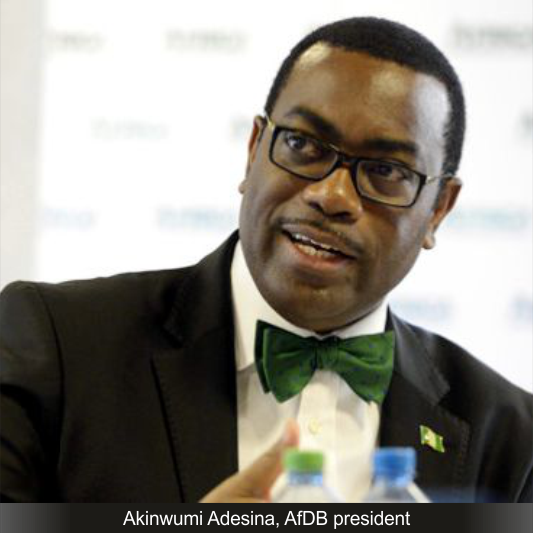The President of African Development Bank (AfDB), Dr. Akinwumi Adesina, has charged African leaders to set economic policies that directly touch on the welfare of their citizens, saying though GDP growth is desirable but that ‘nobody eats GDP’
The development finance expert gave this charge on Tuesday in his opening remarks at the African Delivery Unit Exchange Conference 2020.
This is even as he hinted that the AfDB had started developing a new Africa Public Service Delivery Index to rate African countries on the delivery of public services, adding that the Delivery Unit Exchange will offer excellent opportunities to share best practices and partnerships to improve the delivery of quality projects for transforming Africa.
Specifically, the AfDB President called on African governments to prioritize people-oriented economic policies to alleviate poverty in the continent and position the economies on path of sustainable growth.
He said: “Development is about people. It starts with people, is accountable to people, and must have positive impacts on people.
“The challenge for any government is how to accelerate the delivery of results. Yes, we need economic growth, and it’s always a good sign when GDP grows, but let’s be clear: nobody eats GDP.
Growth must translate into meaningful impacts on the lives of people. What we should be measuring is not the quantum of economic growth, but the quantum of growth in the quality of life of the people”, Adesina stressed.
Citing the position of what President Kenyatta called ‘delivery imperative’ to close what he called ‘the empty space’ between policy and program conceptualization and delivery for people, the AfDB President explained that the need to close ‘the empty space’ motivated him, when he was first elected President of the Banks in 2015, to sharply focus our work on the High5s: Light up and power Africa; Feed Africa; Industrialize Africa; Integrate Africa; and Improve the Quality of Life of the People of Africa.
Noting further that ‘focus is the foundation for success’, the development finance expert said that in the past five years, AfDB financing had impacted 335 million people.
Adesina listed some of the investments as including the Lake Turkana project, the largest wind power plant in Africa; the last mile electricity connectivity project now connecting over 1.2 million low-income Kenyans to electricity; and the world’s largest concentrated solar power plant in Morocco.
He elaborated: “Our work on regional integration supported the landmark Senegambia Bridge, linking Senegal and Gambia, the 1,000 km Addis-Ababa-Nairobi-Mombasa highway linking Kenya and Ethiopia that has increased trade by 400% between both countries. You can feel the impact of the Bank all across Africa.
“We are focused on supporting governments to translate their vision into reality. That’s why the Bank has supported a few African countries to establish Delivery Units to speed up their transformation processes. We are delighted to work on this with the former UK Prime Minister Tony Blair through the Tony Blair Institute for Global Change.
President Kenyatta is rolling out fast, with impressive results, his impactful Big 4, agenda thanks to the President’s Delivery Unit in Kenya. I commend all the Cabinet Secretaries supporting the President to deliver and close the ‘empty space’”, Adesina charged.
According to him, the key is faster, better, results as his experience, both as a Minister in Nigeria and as President of the AfDB, has taught him some lessons on delivery.
He listed some of the lessons as “first, nothing gets done without a very clear vision. The more complex your vision, the less your chances of success. No one can implement what they do not understand.
“Second, publish your expectations for the delivery of your vision. This creates accountability and drives an institutional sense of mission and purpose.
“Third, establish a culture of accountability. Leaders are elected, but those working under or with them are not. Citizens accountability forums should be used to engage on what’s being done and what’s being achieved.
“Fourth, have a rigorous way to measure results. Results power enthusiasm and enthusiasm drives attainment of visions. Public budgets should, therefore, be based on Results-Based Financing.
“Fifth, ensure sustainability. We must avoid frequent policy reversals. Political electoral cycles must no longer truncate development pathways”, Adesina advocated.






